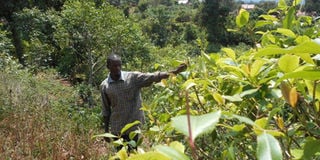Butambala farmers defy govt on mairungi growing

Income. A mairungi farmer inspects his farm in Kibibi Town, Butambala District, recently. Many farmers say it is their source of livelihood. PHOTO BY SADAT MBOGO
What you need to know:
- Alternative. Local leaders say if the government wants to enforce the ban on mairungi, it should find an alternative crop for the farmers.
Butambala.
Despite the ban on Khat (mairungi) business in 2014, farmers in Butambala District have continued growing the crop, saying it is lucrative.
Government banned the production, transportation and sale of mairungi under the Narcotic Drugs and Psychotropic Substances (Control) Act, 2014.
Although the drug is considered as a health hazard, farmers claim that it is their major source of livelihood.
“We have mairungi as the only source of livelihood and government should first get us another crop that can serve as a substitute,” Mr Edrisa Kazibwe, the chairperson Butambala Mirrah Growers and Traders’ Association, said recently.
Mr Kazibwe said government did not sensitise them about the objective of the law before its enforcement.
Farmers’ view
“Laws are not supposed to be repressive, they are put in place to help the community, but we are not ready to abide by this particular one because it is a bad law,” he said.
A bundle of mairungi leaves, weighing about 60 grammes, costs Shs1,000.
Since February, police in Butambala have been arresting mairungi farmers and dealers to reduce drug-related crimes, especially in Kalamba, Kibibi and Budde sub-counties.
According to Mr Ronald Mukisa, the district police commander, 10 people have so far been arrested and another seven mairungi dealers detained at Kibibi Police Station and charged with illegal possession of narcotics.
“We are determined to stop mairungi business in this area. Let our people grow it legally like other cash crops such as coffee, vanilla and maize,” Mr Mukisa said, adding that crackdown on mairungi farmers and dealers will continue despite threats from their leaders.
According to the Narcotic Drugs and Psychotropic Substances (Control) Act, 2014, a person found in possession of narcotic drugs or psychotropic substance is liable on conviction to a fine not less than five hundred currency points (Shs10m) or three times the market value of the drug or to imprisonment not less than two years, but not exceeding 10 years or both.
Mr Godfrey Mafumu Kyeswa, the district chairperson, asked Parliament to review the drug Act, citing gaps in some of the provisions.
“Instead of putting a total ban on mairungi, I propose that there should be control on the use of the crop because we have never received any report in our district about someone getting a mental disorder because of chewing mairungi. We only receive reports that our people are prospering as a result of growing the crop,” he said.
Mr Kyeswa concurred with Mr Kazibwe, saying if the government wants enforce the ban, they should find an alternative cash crop for the farmers.
“As we continue to engage government to review the Act in question, we are also embarking on a campaign to sensitise our people to find alternative crops such as ginger and coffee on a large scale,” he said.
Mr Wahab Lumala, a mairungi dealers in Kibibi, said he earns between Shs1.5 million and Shs1.2 million from his one acre monthly.
“We have ready market and we sell mairungi in Mbarara, Jinja, Malaba, Kampala and Fort Portal. We have engaged in this business since the liberation war of 1986. Don’t you see that it is our only source of livelihood?” he asked.
Mr Shaban Ssenfuka, a resident of Mpanga Village in Bulo Sub-county, decried the police harassment, saying they are thriving in business owing to the huge demand.
Mr Muwanga Kivumbi, the Butambala County Member of Parliament, said police officers enforcing the ban solicit bribes from suspects.
“The law we passed in Parliament has a provision directing the concerned ministry to come up with a statutory instrument specifically on mairungi,” Mr Muwanga said in an interview last weekend.
Gaps
He said after the enactment, Parliament tasked government to first carry out civic sensitisation and introduce an alternative crop but nothing has been done.
Section 89(2) of the Drugs and Psychotropic Substances (Control) Act, 2015 says without prejudice to the general effect of sub section (1) the minister may, under that subsection(1), make regulation for all or any of the following matter- (g) determine the enforcement day for prohibition of growing and dealing in catha edulis(mairungi).



